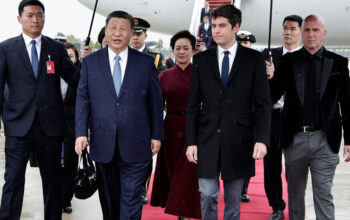
The brutalities of Russia’s war in Ukraine have stoked enormous demand among Ukrainians and much of the Western world for investigations, indictments, arrests and trials for the invaders and their commanders, notably President Vladimir V. Putin of Russia. Some leaders, including President Biden, have even accused them of genocide.
The calls for accountability have pressed for prosecutions not only at the International Criminal Court in The Hague, which was established precisely for such a purpose, but in other courts and even special war crimes tribunals that could be created specifically to put suspects on trial, like the proceedings against the Nazis who were judged at Nuremberg.
And yet, despite the speedy collection of evidence in Ukraine and an outpouring of international cooperation to build criminal case files, the likelihood of any significant war crimes trials, much less convictions, could be years away — if they ever occur — especially for Mr. Putin.
The Russian authorities have denied all responsibility for civilian killings and abuse, and Mr. Putin has falsely depicted the troves of evidence as fabricated smears.
“Everybody wants the war to stop, and save Ukraine immediate pain, and see the chief perpetrators in the dock,” said Leila Sadat, an international law professor at Washington University in St. Louis and an adviser to the International Criminal Court’s chief prosecutor. “Unfortunately, that is not going to be quick.”
What, exactly, are war crimes?
They are actions by antagonists in armed conflicts that violate international agreements and treaties like the Geneva Conventions of 1949, which were designed to limit the barbarities of war and protect the lives and safety of noncombatants — civilians, medics, aid workers — as well as soldiers who can no longer fight, like prisoners, the wounded and the sick. It is a war crime, for example, to knowingly bomb a hospital, a school or a place where civilians are sheltering, or to kill enemy soldiers who have disarmed and surrendered.
What Does the International Criminal Court Do?
The court, established in 2002 under an international treaty known as the Rome Statute, was empowered by the countries that ratified the agreement to investigate and prosecute not only war crimes but two arguably more sinister types of crimes: genocide — acts aimed at destroying a racial, religious, ethnic or national group — and crimes against humanity — acts including murder, enslavement, rape and other sexual abuse, torture, starvation, abduction and forcible displacement as part of a widespread, systematic attack.
In 2018, the court was empowered to investigate and prosecute a fourth type of crime: the crime of aggression, which prohibits the leaders of any country from “the planning, preparation, initiation or execution” of an attack on another country in violation of the United Nations Charter — in other words, making it illegal to invade another country. Although major restrictions were placed on the court that narrowed its jurisdiction in crime-of-aggression cases, legal scholars said it was the first time since the Nuremberg Trials that an international tribunal had been empowered to try suspects for crimes against peace.
Why are many of these crimes difficult to prosecute and prove?
The circumstances of what constitutes a war crime can be fuzzy and disputed. The bombing of a hospital may appear to be an obvious war crime, but the attacker could argue that the bombing was unintentional, or that the building had been used by enemy troops, or that it had been storing weapons. Such assertions cannot be easily disproved in court. Just because civilians are killed in an armed conflict does not necessarily mean they were deliberately targeted.
Genocide convictions are even harder to attain because they require an especially high burden of proof. While the evidence may be there — mass graves, razed villages, witness testimony, intercepted communications — prosecutors must show that the defendants were committing atrocities with the intent to destroy a particular group. That essentially requires getting inside the minds of the perpetrators.
Jurisdiction is another issue. Only 126 countries have ratified the Rome Statute — meaning the International Criminal Court’s authority to prosecute is generally limited to those countries, which conspicuously do not include Russia or Ukraine (or the United States). Ukraine has granted the court jurisdiction to prosecute war crimes, crimes against humanity and genocide, which can proceed without the need for Russia’s consent. But prosecuting the crime of aggression would require consent from Russia, the aggressor, which legal scholars say the Kremlin would never provide.
Moreover, trials at the International Criminal Court require the defendants to be present. The court has no power to enforce its arrest warrants. The likelihood that Russia would extradite anyone to face such trials is extremely remote.
Is the crime of aggression easier to prove than other crimes?
Yes, and it is easier to prove the guilt of the people responsible. In the case of Ukraine, there is no dispute that Russia massed forces on the Ukrainian border for months and invaded on Feb. 24. It is clear that Mr. Putin and his immediate subordinates gave the orders. Many world leaders, including the secretary general of the United Nations, António Guterres, have said Russia violated the U.N. Charter.
“There’s no question an act of aggression was done,” said Alex Whiting, a visiting professor of international law at Harvard and a former war-crimes prosecutor. “And the most straightforward case, in a crime of aggression, is against Putin himself.”
Nonetheless, for now at least, the prospect that Mr. Putin or other Russian leaders would soon face criminal prosecution at an international court on such charges appears remote.
Have other national leaders been prosecuted for war crimes?
Yes, and those prosecutions took years. Slobodan Milosevic, the onetime leader of Serbia and Yugoslavia who presided over ethnic atrocities in the Balkan wars of the 1990s, was the first former head of state to be tried for war crimes, in 2002. He died in his cell in The Hague as his four-year trial in a special court drew to a close, before a verdict had been reached.
Charles G. Taylor, the former president of Liberia, was sentenced to 50 years in 2012 by a special court for atrocities committed in Sierra Leone during its civil war in the 1990s. Laurent Gbagbo, the former president of Ivory Coast, was acquitted at the International Criminal Court in 2019 of crimes against humanity and other charges related to violence that followed the country’s presidential election in 2010.
The International Criminal Court issued an arrest warrant for Libya’s former leader, Col. Muammar el-Qaddafi, in 2011 accusing him of crimes against humanity, but he was killed that October in Libya.
Former President Omar Hassan al-Bashir of Sudan has been wanted for many years by the International Criminal Court on charges of genocide and war crimes in the Darfur region, but he has not been extradited by Sudan’s transitional government.
In 2018, a special U.N.-backed tribunal in Cambodia found that the Khmer Rouge had committed genocide during its notorious rule four decades earlier, and the tribunal issued guilty verdicts against the two most senior surviving members of the regime, Nuon Chea and Khieu Samphan.
Can Russians face charges in other courts?
Yes. The Ukrainian judicial authorities have made clear they intend to prosecute criminal cases against Russians in Ukraine and elsewhere, including countries in Europe that have embraced universal jurisdiction — the legal principle that some crimes are so odious they are an affront to humanity at large, and therefore can be tried by any nation’s court system. On Thursday, the Ukraine prosecutor general’s office posted a graphic on Twitter accusing Russia of more than 6,400 crimes of aggression and war crimes since the invasion.
There are some expectations that Ukraine and sympathetic countries at the United Nations or within the European Union may organize a special tribunal just for the purpose of prosecuting Russian leaders for the crime of aggression. The risks, critics of that approach say, are that such a court lacks the appearance of impartiality, that it would need enormous investment and preparation time, and that the defendants would never participate.
Payam Akhavan, a law professor at the University of Toronto and a former prosecutor who was involved in the special tribunals created for war crime prosecutions in Rwanda and the former Yugoslavia, said a special tribunal for Ukraine would be a mistake.
“This is not a Nuremberg moment,” Mr. Akhavan said, arguing that efforts would be better spent strengthening the International Criminal Court’s powers. “There is no need to reinvent the wheel.”
Victoria Kim contributed reporting.


